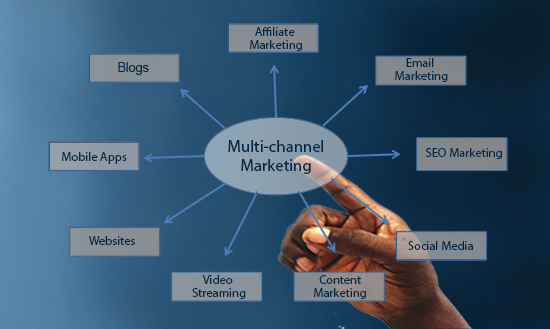Multi-Channel Content Marketing and Reasons for Failure
https://admateacademy.blogspot.com/2017/05/multi-channel-content-marketing-and.html
 |
Multi-channel content marketing is a phenomenon that has proven to be one of the most effective strategies used by digital marketing companies to engage audience from multiple social media platforms at the same time, in an attempt to generate leads. The digital marketing industry offers influencers, content curators and social media managers, an array of digital marketing channels which they can use either individually or as a mix of two or more channels to promote a content, product or service.
Ecommerce forms the bedrock of digital marketing, and most advertising and marketing campaigns aim to attract traffic to the storefront where ecommerce transactions take place. To generate leads to the company’s website, their digital marketing strategy, would have determined the marketing approach and channels to use for the campaign, and often, multi-channel marketing is preferred, because of its large audience and spread.
What is Multi-Channel Content Marketing?
Multi-channel content marketing is a digital marketing strategy where a marketer uses several marketing channels to simultaneously promote and share content with the aim of reaching a wider audience and attracting more traffic to a company’s website and increase the conversion rate. Multi-channel marketing is defined by Emarsys as the implementation of a single strategy across multiple channels or platforms, thus maximizing opportunities to interact with prospective customers. A channel might be email, a print ad, a retail location, a website, a promotional event, a mobile app, SMS messaging, a product’s package, or word-of-mouth.
Digital marketers and content creators broadcast thousands of digital content daily on various Social Media channels including blogs, websites, email marketing and others. The multi-channel marketing approach makes tracking a lot more complex to achieve optimum count of the impressions, engagement and clicks from the various channels where you shared your content or promoted your brand, except for marketing companies that uses multi-channel digital marketing and tracking software to collate all the analytics from the various channels used for a particular campaign.
Consolidated Performance Record
The page views, engagements and impressions captured in various social media channels, which Google crawlers are unable to capture in order to provide a consolidated analytics of the site's performance of each campaign, increases the plight of multi-channel content marketers. The choice of social media channel that a digital marketer uses depends largely on the target audience for that particular product or service. However, some of the most used social media channels are Facebook, Twitter, LinkedIn, Google+ and Instagram.Ecommerce forms the bedrock of digital marketing, and most advertising and marketing campaigns aim to attract traffic to the storefront where ecommerce transactions take place. To generate leads to the company’s website, their digital marketing strategy, would have determined the marketing approach and channels to use for the campaign, and often, multi-channel marketing is preferred, because of its large audience and spread.
Reason for low Performance
The most difficult part of multi-channel marketing is choosing a mix that will produce a high ROI, and one of the common reasons why most multi-channel marketing strategies fail is because of the wrong choices made by digital marketers when selecting their marketing mix. Which often times is due to a lack of understanding of trends and consumer behavior as regards the digital marketing industry. Failure to conduct a study of the market and understanding the content type that is most effective for a particular social platform will certainly result in dismal performance. Getting your digital marketing strategy right is the sure way to avoid failure when using the multi-channel marketing option.
Content from the website or blog that are shared through the various social media channels simultaneously, have their own analytics of page view, engagements and clicks within the social channels. These analytics are rarely accounted for when measuring the performance of a particular advert, promotion or content, rather, the analytics of the website is what counts. As a result, so many multi-channel marketing campaigns have failed to achieve maximum performance because some digital media marketing companies fail to collate all the results from the various other channels into a consolidated analytics that captures the real performance of a campaign.
It is true that all social media marketing sites including Facebook, Twitter, Google+, WhatsApp and others, indeed have provision for analytics, which allows you to read the performance report of your post. Traditionally, the website analytics forms the basis for determining the performance of most campaigns, and many marketers and content creators rely solely on their website analytics, believing it captures all the visits and engagements originating from other sites, without realizing that websites cookies captures conversions, engagements and page views within the site, and click-through from other URLs. The website cookies capture only click-through from social media sites, excluding engagements and page views.
Collating the analytics of each social media site you used in promoting your content manually is possible, but tedious and unnecessary. Usually you can achieve a better overall performance of your campaign if you compile the different page views, engagement and clicks from each of the social media platform that you have used. The results from the various social media channels will show performance that is much more impressive. Reeve up your engine and engage top gear by using a multi-channel digital marketing software to manage your marketing campaigns, it is convenient, affordable and effective.



















